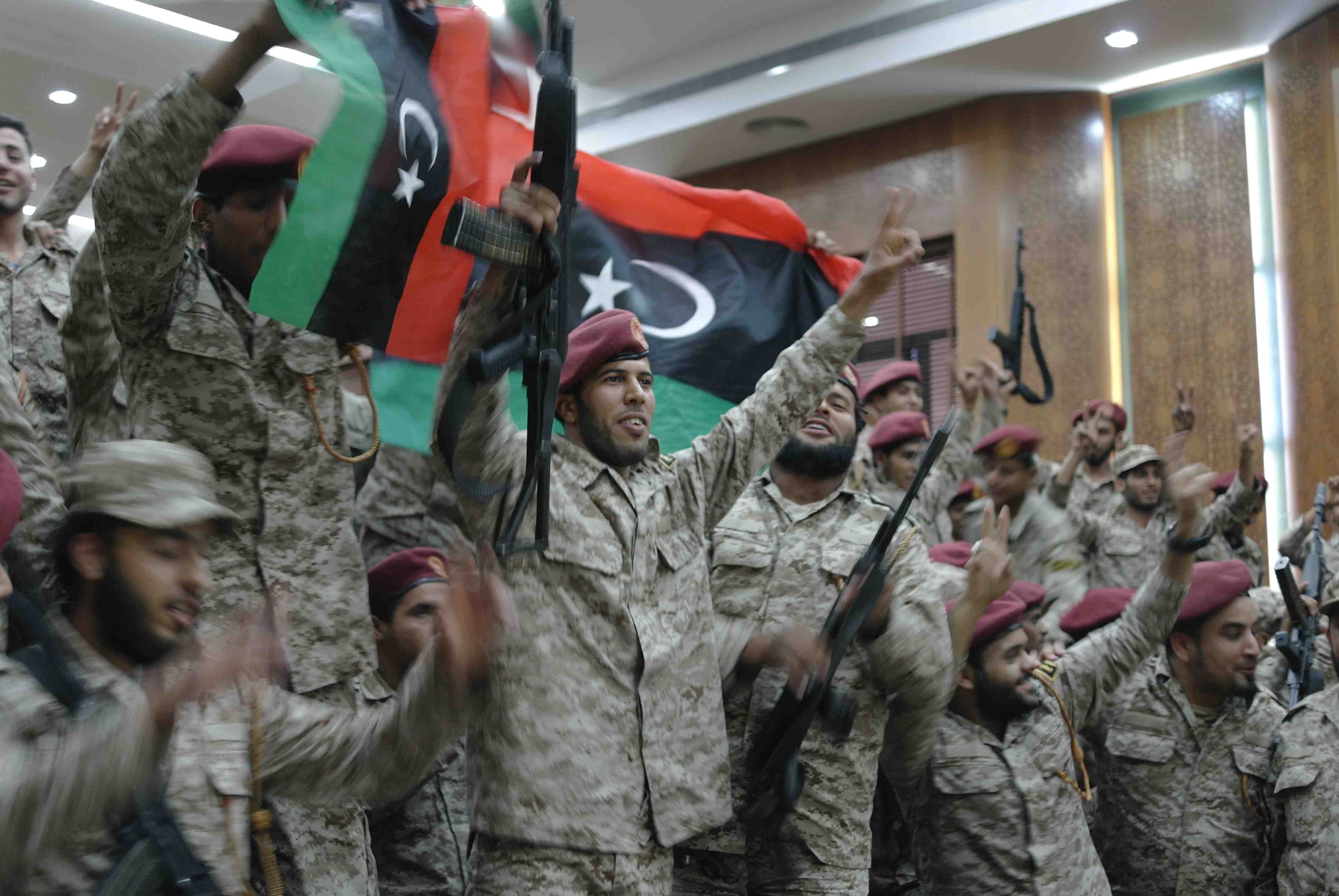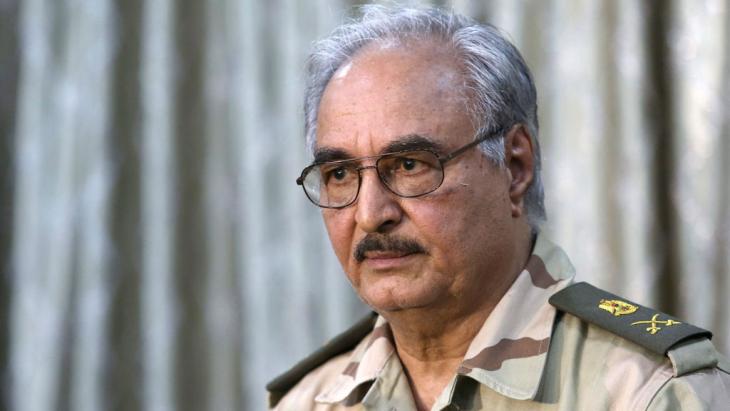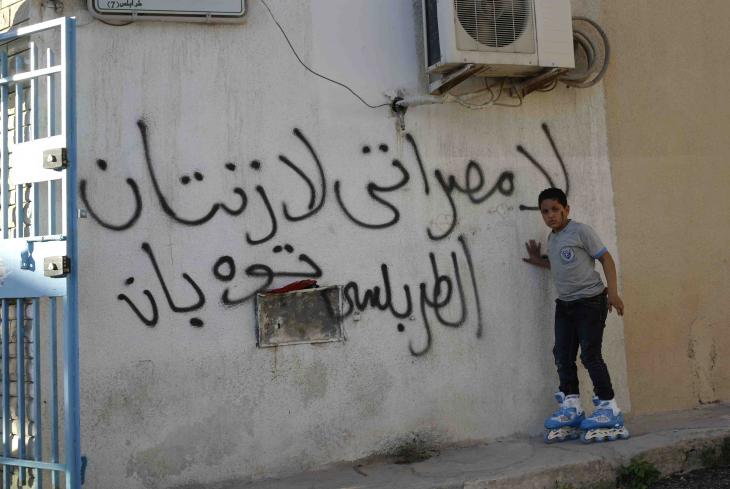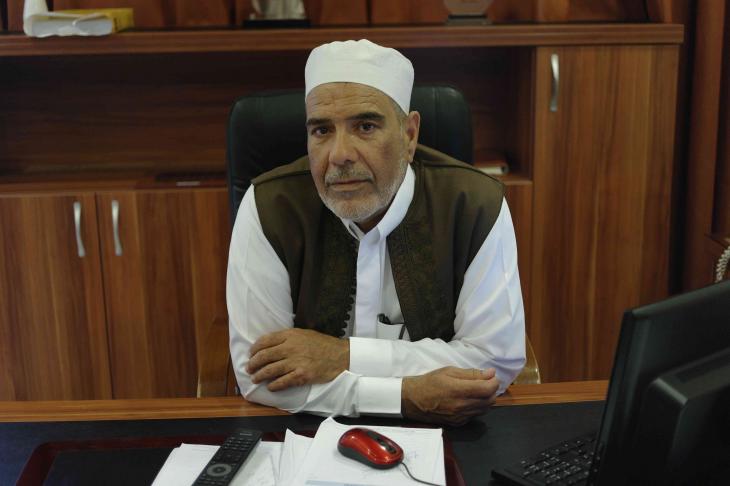A permanent state of chaos

On 16 May, for the second time this year, Major-General Khalifa Haftar dissolved Libya's acting parliament, the General National Congress (GNC), and announced that under the supervision of his Libyan National Army (LNA), power would be transferred to the Supreme Court or to the so-called "Committee of 60", the Constituent Assembly tasked with drafting Libya's constitution.
Just like the last time, in February of this year, his announcement was not initially taken very seriously. After all, the LNA is not as such an army, but a dissident group that was formed in the 1980s and later dissolved. What was different this time was that Haftar came up with a new strategy to gain allies and win over Libyans' hearts and minds.
"Operation Dignity"
Since the revolution, extremist groups have spread throughout Libya and in particular its eastern province, Cyrenaica, where such groups preach hatred of the West and call for resistance against the "imposed democracy". It was on these groups and their "political allies" – i.e. the Muslim Brotherhood and Islamist members of the GNC – that Haftar declared war. In a surprise move, the Libyan Air Force and Special Forces took his side and launched attacks on militia bases in Benghazi in an attempt to drive out the extremist group Ansar al-Sharia and the ex-rebel brigades (or militias) that led the eastern offensive against the Gaddafi regime in 2011 and have staunchly refused to disarm ever since.
While heavy fighting in Benghazi disrupted business and air traffic, back in the capital, anti-Islamist militias armed with rocket launchers, attacked the GNC in an attempt to force its demise. This is not the first time they have taken such action. Back in February, they issued an ultimatum to GNC members to resign or be arrested. Haftar's anti-terrorism campaign, dubbed "Operation Dignity", suits these militias just fine.
In Tripoli, heavy fighting broke out between opposing anti- and pro-Islamist militias, all of whom officially belong to the security apparatus but are actually only pursuing their own ends. Once again, GNC spokesperson Nuri Busahmain called on forces from the coastal city of Misrata to come and "protect" the capital, even though the latter were forced to pull out of Tripoli only last year in the aftermath of a bloody confrontation with protesters.

Caught in the crossfire between two rival political camps – which can roughly be described as Islamist-revolutionary on the one hand and secular-nationalist on the other – the government struggled to find an adequate response to these events.
Meanwhile two men were fighting over the premiership. One was Defence Minister Abdallah al-Thinni, who has been provisional head of government since the ousting of the liberal PM Ali Zeidan in March; the other, Ahmad Maitig, is the protégé of the Muslim Brotherhood from Misrata, whom the GNC charged with forming a new cabinet in a disputed internal vote last week.
A Libyan soap opera
Having been expelled from their meeting hall, GNC members now hold their sessions in hotels, whose location is disclosed to them shortly beforehand by text message. At first, the GNC responded by giving in to the pressure and bringing elections forward from August to 25 June. This move is in line with the majority opinion; people here are deeply disappointed with the government's performance so far and want to see the incumbent institutions replaced as soon as possible, even if it is only for a short transition period.
Then, on the evening of Sunday, 25 Mai 2014, in a surprise move, 83 of the 95 Congress members in attendance ratified Maitig and his cabinet, contradicting Maitig's claim in the wake of the vote that he had not even set up his own list yet. His appointment was signed off by Congress spokesperson Busahmain, who has not appeared in public for weeks due to allegations that he welcomed prostitutes into his home. First deputy speaker Azzedin al-Awami objected to the decision, claiming that neither he nor many other deputies from the secular-nationalist camp had been informed of the session and that 95 attendees did not make a quorum.
It remains unclear who currently heads the Libyan government. Meanwhile, Khalifa Haftar's suggestion of a power transfer is rejected by both his institutions of choice (the "Committee of 60" and the Supreme Court), neither of which wants to take over the GNC's responsibilities.
Libyan domestic politics is increasingly resembling a soap opera. Act two, scene eight, revised plot with new twists and more supporting actors to make sure the audience loses the plot entirely. In response to the daily absurdity, many in Libya resort to satire and cynicism.

Who is "Operation Dignity" targeting?
Libya is at a crossroads, with many wondering whether it is still possible to pull the country back from the brink. Power struggles have been detrimental to security sector reform, and all attempts to impose law and order have come to naught. It is a vicious circle, as the demobilisation of revolutionary forces is a precondition for the formation of an army loyal to the state. However, these forces have little interest in either laying down weapons or giving up power, especially as they are still being financed by public funds. Their indisputable argument is that there is no higher authority to protect them should they disarm.
On the Islamist militia spectrum, the line separating "legitimate" and "illegitimate" armed forces is very thin, and at the extreme end there are violent militant groups such as Ansar al-Sharia or the recently emerged splinter group Usood at-Tawheed (Lions of the oneness of God).
Seeking to impose Sharia law on state and society, these groups are waging an open war against the "infidel" state with massive collateral damage. In addition to bombings, security officers and public figures who go too far in their criticism of the militias are being assassinated on an almost daily basis. Among the latest victims was the editor of a Benghazi newspaper who spoke out against the Muslim Brotherhood and Maitig's disputed nomination in a TV interview on the eve of his death.
No-one claims responsibility for these acts of violence, but Libyans widely denounce the extremists and militia leaders as the main culprits. Benghazi residents have long demanded drastic security measures. But the government's hands are tied by the manifold tangled links between the militia scene and the political arena.
"Pact with the devil"
Khalifa Haftar's crusade is troublingly similar to that of army chief Abdul Fattah al-Sisi in neighbouring Egypt. From his supporters' point of view, the latter also abrogated a young democracy undermined by Islamist forces for the sake of stability.
Nevertheless, Haftar has not won over the Libyans. Once commander of Libyan troops in the disastrous "Toyota-war", the last stage of Libya's decade-long confrontation with Chad, Haftar ended up in captivity and was disavowed by Gaddafi. Disappointed by this treason, Haftar defected to the United States, allegedly with the help of the CIA, which was at the time funding his LNA, hoping he could overthrow the Libyan regime. Following a failed coup d'état, Haftar withdrew from the exiled opposition movement and only re-emerged on the public scene in 2011, when he led rebel ground troops against the regime from Benghazi. Haftar's attempts to rise up to chief of staff failed as he made enemies in the rebel coalition. Moreover, his fellow Libyans were suspicious of his ties to foreign intelligence services.

In search of a strong leader
Since then, the situation has changed, however, as Libyans are increasingly calling for a strong leader capable of stemming the daily violence. "Democracy has become luxury that we can no longer afford. We know we are signing a pact with the devil in order to get rid of the extremists," said one Benghazi activist, his voice full of regret. These feelings are shared by so many others across the country.
What causes concern is that Haftar is clearly targeting not just the extremists, but the entire Islamist political scene. Speaking to foreign media, he openly stated his intention to "purge" Libya of the Muslim Brotherhood. Rumour has it that he has the support of Saudi Arabia and Egypt.
His tough stance also pleases many of his Libyan allies, held together primarily by their hatred of the new Islamist elite. In order to ensure their continued support, Haftar baits disgruntled military veterans and security officials with the prospect of a strong army, reassures liberals of his respect for civil rights, promises reactionary tribal leaders reconciliation and the return of exiles, and secretly discusses the terms of regional autonomy with Cyrenaican separatists.
Diverging positions
Some of the cracks between the different groups in Haftar's coalition are already visible. In an interview, Mansur as-Salihin, one of the top leaders of the militant federalist group that has been blockading oil terminals for the past 10 months, said that his supporters were not so keen on democratic change. "What we need", he explained, "is a benign dictator or a 'sleeping' monarchy like they have in the Gulf countries. Western concepts of democracy do not work in Libya".
Under the slogan "Support for Operation Dignity", thousands of Libyans took to the streets of Tripoli, Benghazi and other Libyan cities on Friday, 23 May 2014. But the popular mandate that Haftar would like to derive from these protests is not at all obvious. Only a few portraits of Haftar could be seen in the crowds; most people were merely demanding the empowerment of the army and police.
Libyans still hope that they will be able to overcome the crisis without sacrificing the freedoms they fought for in the revolution. How realistic this hope is will be revealed in the upcoming early elections and what follows.
Valerie Stocker
© Qantara.de 2014
Editor: Aingeal Flanagan/Qantara.de
